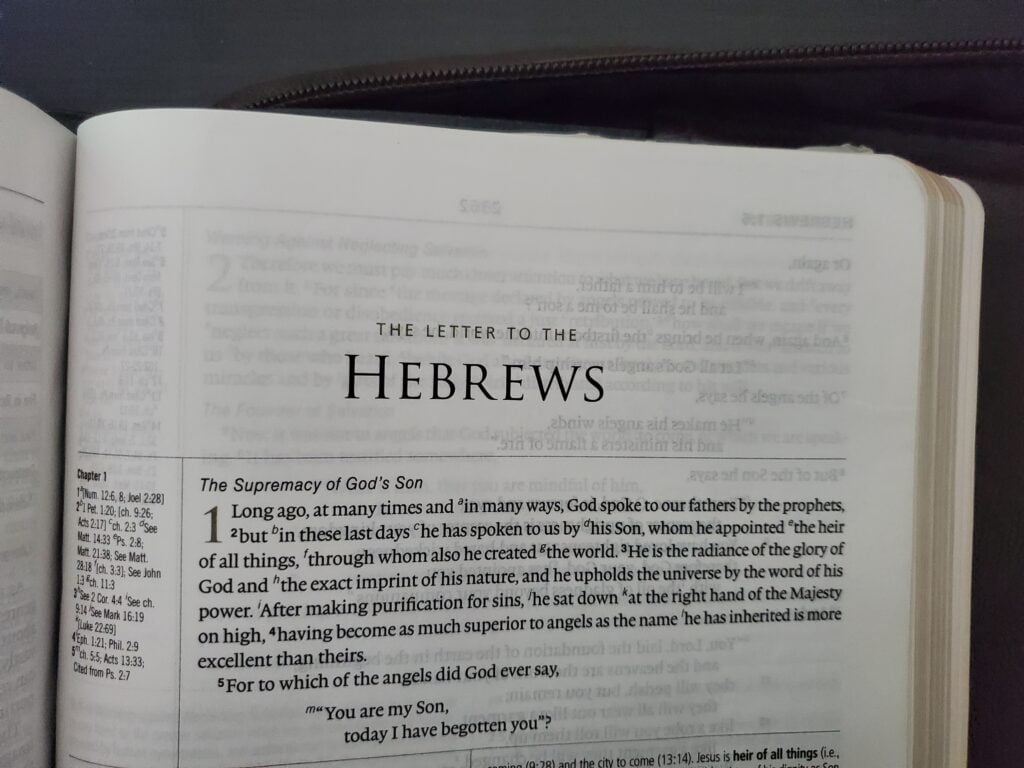⏱️ Estimated Reading Time: 9 min read
Let me tell you why I love Hebrews and why you should, too.
This epistle confirms for us that the pictures and shadows of the Old Testament point to the superiority of Christ, his sacrifice of obedience in life and death, and the new covenant. Hebrew believers were urged not to turn back to the insufficiency of the old covenant and exhorted to faithfully embrace a transformed, redeemed life in him. A life that fully incorporates the teaching of chapters 1-9 will also fully practice the exhortations to godly conduct, such as those laid out from Hebrews 10:19 to the end of the sermon. We continue our study today in chapter 13, where we see a summary of the sermon laid out in just three verses.
So Jesus also suffered outside the gate in order to sanctify the people through his own blood. Therefore let us go to him outside the camp and bear the reproach he endured. For here we have no lasting city, but we seek the city that is to come. (Hebrews 13:12–14)
In the verses immediately preceding this passage, the author established that anyone who continues to put any trust in the service of the tabernacle will not have access to the benefits of the new altar, which is Christ (verse 10), then our attention is drawn to a location that stands in stark contrast to the tabernacle: “outside the camp” where the bodies of the sacrificial animals are burned (verse 11).
In the wilderness and upon arrival in Canaan, the people of God were instructed to situate themselves within the bounds of the camp around the tabernacle, where God resided. There they received the full benefit of God’s power and presence. The pillar of fire rested at the entrance of the tabernacle, and everything outside the camp was outside the presence of God. The people outside the camp were not his people. Guy Richard writes: “When I say that God was not covenantally present outside the camp, I mean that the promise, ‘I will be your God, and you shall be my people’ was applied only inside the camp (Exodus 6:7; Jeremiah 7:23). God was not the covenantal God of those who were outside the camp, and they were not His people.” (1) To the Jew performing the services of the tabernacle, outside meant danger, uncleanness, and without the rudder of the old covenant system.
Many centuries later on a hill outside of Jerusalem, outside the gate, our Savior was crucified, the crushing weight of the sin of his people bearing down on him. He went to the outer darkness, his life extinguished. As the bodies of the animals were consumed by fire outside the camp, so on the cross Jesus, who was in the firestorm of the pillar, was consumed by God’s wrath. The offense was so great and the offended One so holy and righteous that no other sacrifice would bring sufficient propitiation. And it was all done outside the gate.
Thanks to Hebrews, the reversal of blessing this means for the people on the outside becomes clear.
Jesus the Son of God bore the wrath of God for his people outside the presence of God, outside his Father’s countenance. He endured suffering and separation. He whose very person defined “inside” was not inside; he was not to be found in the tabernacle among the priests, not part of an empty service that vainly looked forward to what was already here. Without him, therefore, its every performance was henceforth futile and useless.
Outside to the Jew may have meant discomfort, death, and loss, but it always meant separation from God’s presence. Outside to the believer may mean all those things, but it always means Christ.
Of course, we know that “outside” is not a place but a posture, an identity. Christ is not limited to a location and neither is the church. The place where God resides is no longer the temple but the hearts of his people who take on his posture, who seek to abide with him, who are made alive by the Spirit and are bent toward him as they grow, who identify with him in suffering. “Let us go to him,” says the text. That doesn’t seem too burdensome, does it? The world is full of people who identify themselves as Christ followers. It’s the next phrase that is difficult to swallow, “[Let us] bear the reproach he endured.” We can’t bear the sins or the wrath, but we can, by the sanctifying power of his blood, bear the reproach that “not my people” bear when they are born anew into “children of the living God” (Hosea 1:10).
What does outside the camp mean to you? Do you picture unfamiliar ground? Is it unsafe? Being uncomfortable? Facing instability? Will you be homeless, encounter disease or harm? Will you lose family and friends while strangers surround you? Will your reputation be damaged? Will people lie about you? Hold you in contempt? All things Jesus knew.
Outside to us can represent a life stripped of familiarity, and by comparison, inside can feel like Eden. We know that what happens here day after day is not the way it’s supposed to be, and we long for something better. That yearning strives to be realized in an Eden here and now. A better Eden awaits all in Christ, but sometimes we just want it now. We talk about trusting God and bearing Christ’s suffering, but we just don’t want to fight that sin, face the unknown, interact with hurtful people anymore. The wait seems endless, so we start to patch a fake Eden together, filling it with pretty much anything to make the days more bearable, to reduce the struggle, to give our minds peace and our life meaning. Sometimes this results in the addition of a little false teaching, not unlike the false teaching the Hebrew Christians were being warned against, the kind that accommodates the demands of the law through our own rituals, our own checklists for a perfect life.
Let’s be clear about this: a fake Eden cannot bear what only the perfect altar is meant to bear. It is idolatry when we obsess over figuring out how to feel better when our gaze should be on our steadfast Sin-bearer and his cross.
I know all about this idolatry. I once succumbed to the allure of crafting an Eden where I was sure God would be pleased with my efforts to have a perfect life. For a little while it made me feel better, but then through suffering God called me to leave the futility of the altar in my fake Eden and go to Jesus outside the camp, where his blood had spilled to sanctify me, empowered by the Holy Spirit to strengthen my soul and encourage me to continue in the faith (Acts 14:22). His suffering has power to free us from the endless failed attempts to do this on our own.
We won’t find an Eden outside the camp, but we will find home. We will find rest. We will find freedom. Charles Spurgeon urges us not to simply go outside, but to go to him. (2) We go there to be with Eden.
What kind of fake Eden are you building? This life inside is the way of death. Those who rely on anything other than Jesus for comfort or salvation are barred from his altar, from receiving the benefits of the sacrifice of his blood. Whatever gets between you and Christ must be left inside the gate. This includes your children, your friends, your ambition, your accomplishments.
Does your heart yearn to be with him? Do you feel out of place in this world? Are you homesick for a rest unlike anything offered inside the camp? Everyone else seems so comfortable and at home in the world, but what about you? Has what once delighted, amused, or enticed you now come to sadden, shock, or grieve you? Do you see now how no mere performance at the altar of the world will never be anything but empty and vain? Do you yearn to be with Jesus, no matter where he is?
“Never, never be ashamed to let men know you derive all your comfort from the atoning blood of Christ and for His substitution for you on the cross,” says J.C. Ryle. “Cling to Christ, lastly: and make much of the old foundation truths concerning salvation by His blood. These are the old friends to which our souls will turn at last in the hour of our departure.” (3)
With him, we are crucified to this world. He didn’t die to make the world like paradise. He died to separate us for paradise, that better Eden.
Anytime we attempt to craft a propitiation other than that provided by Christ alone, we miss the bounty of his altar, the freedom of his sacrifice, the security of his eternal priesthood, and the promise of citizenship in his continuing city. This camp is fading away into nothing (1 John 2:8), and by loving it too much, we risk fading away with it.
You see, it doesn’t ultimately matter where on the map “outside” is, just that we know it is with him, that we follow the trail of sanctifying blood to our altar, Jesus, where our rest and freedom is paid for, where our place in paradise is secure. Our Eden is Christ himself. Go to him.
And that’s why I love Hebrews.
- Guy Richard, “Did Jesus Descend Into Hell?”, Tabletalk Magazine, January 2019
- Charles Spurgeon, “Suffering Without the Camp” (#2660), 1/30/1858
- J. C. Ryle: Old Paths




